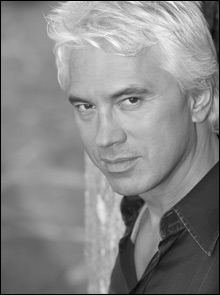
Dmitri Hvorostovsky |
Ну, что, как вы — oops, sorry, that’s what happens when the conversation around you is all-Russian-all-the-time. Siberian baritone Dmitri Hvorostovsky graced Symphony Hall a week ago Tuesday, and it did seem that the only English speakers were the ushers. The balconies were packed; there were broad swaths of empty seats on the floor, however, victims of the $150 top ticket price. This made for an engaging intermission show, as those who had bought, or were now occupying, the choice seats signaled to their friends in the balcony to come on down. When the concert resumed, the floor was packed and parts of the balconies were deserted.The announced program was not high-profile: all-Russian, opera in the first half (the best-known arias being from Tchaikovsky’s Evgeny Onegin and The Queen of Spades), art song in the second, with Hvorostovsky — dubbed “one of the voices of the century” by Opera News — backed by the Moscow Chamber Orchestra under Constantine Orbelian and the Style of Five folk ensemble. It was the Moscow Chamber Orchestra — some 25 members, first and violins grouped rather deployed antiphonally — that started the evening, in a performance of the Overture to Aleksandr Alabiev’s Moonlit Night that was neither remarkable nor, quacking oboe aside, particularly Russian. The white-maned Hvorostovsky then entered, in a drapy black silk shirt and what looked like black chinos, to sing “Vy mne pisali” (“You Wrote to Me”) from Onegin and “Ves tabor spit” (“The Entire Camp Sleeps”) from Rachmaninov’s Aleko, before the orchestra continued with the “Dawn on the Moscow River” introduction to Mussorgsky’s Khovanshchina. Hvorostovsky reappeared for two works by Anton Rubinstein, the Demon’s aria from The Demon and Vindex’s Epithalamium from Nero, the orchestra played the Song of the Peasants from Borodin’s Prince Igor, and Hvorostovsky finished off the first half of the concert with Yeletsky’s “Ya vas lyublyu” (“I Love You”) from The Queen of Spades.
The highlight here was the five-minute Khovanshchina excerpt: Orbelian was as alert as he had seemed sleepy in the Alabiev, the oboe, still reedy, in the Russian manner, was sinuous and seductive, and the pealing of morning bells painted a vivid picture of the Kremlin. It made me wish they’d go on and do the opera. Hvorostovsky has a big, generous voice, but I missed the bass glints that this music seems to call for, and he doesn’t sing with much variety of tone or phrase with much subtlety — he’ll give you one big inflection rather than a dozen little ones. Even “Vy mne pisali” had little emotional impact.
For the second half of the program, he and the orchestra were joined by three members from the Style of Five, a contemporary folk ensemble from St. Petersburg: Natalia Shkrebko on domra, Irina Ershova on alto domra and gusli, and Valentin Zaviriukha on accordion. (If group leader Evgeny Stetsyuk was on stage playing synthesizers, I couldn’t see or hear him; he was, however, credited with all the second-half arrangements.) Midway through, Orbelian announced that they were going to make some changes to the program. In fact, they’d already moved up two numbers, Boris Fomin’s “Tolko ras” (“Only Once”) and Pavel Bulakov’s “Gori, gori, moya zvezda” (“Shine, Shine, My Star”), on which Hvorostovsky had done some of his most fervent singing, though a number of audience heads were buried in the program lyrics trying to figure out where he was. Two Neapolitan folk songs, for which we had no lyrics, were substituted, the domras acting as mandolins, and finally “O sole mio,” which sounded like “O sole mie” in Hvorostovsky’s undistinguished Italian enunciation. There was no want of grand manner, however, and at one point the two trumpet players stood up and could be seen wearing sombreros.